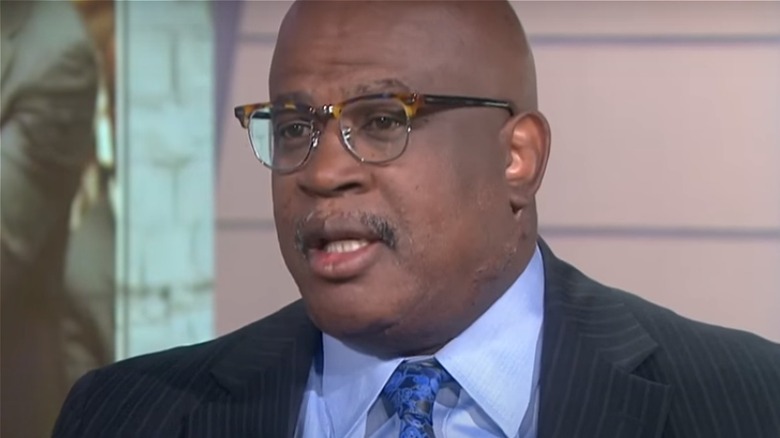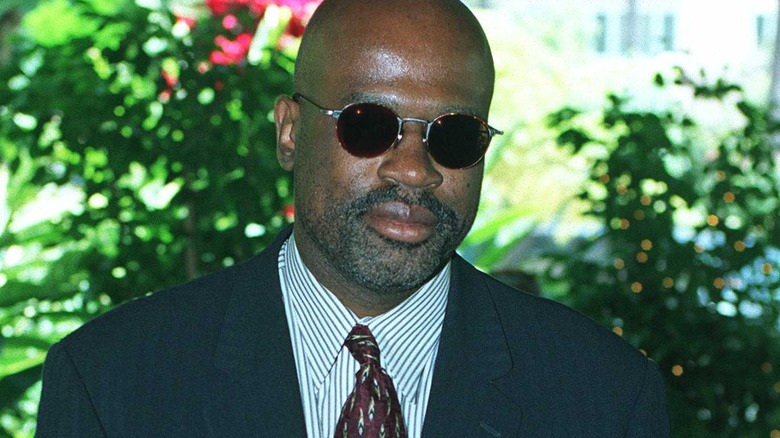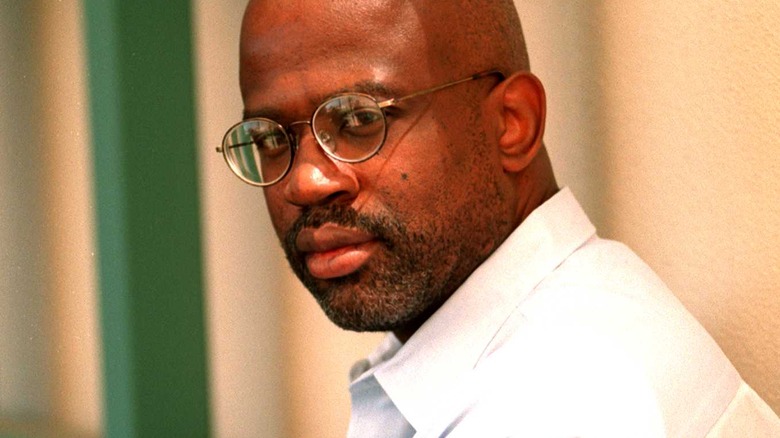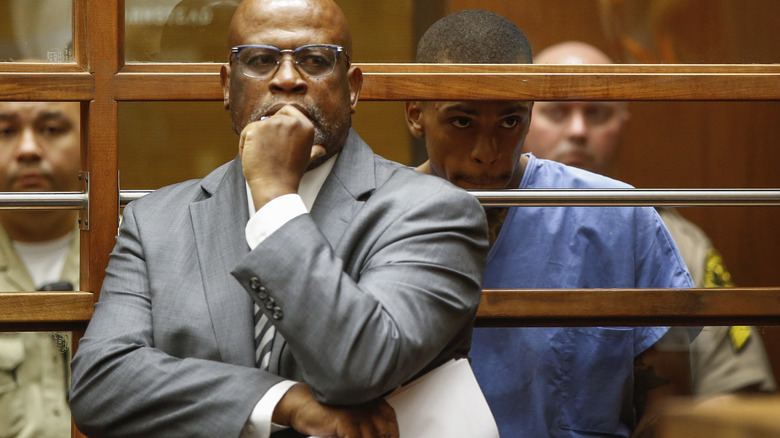Whatever Happened To Christopher Darden From The OJ Simpson Case?
On October 3, 1995, former NFL player Orenthal James (O.J.) Simpson was acquitted on two counts of murder. The charges stemmed from the brutal killings of Simpson's former wife Nicole Brown Simpson and her friend Ronald Goldman. As reported by History, the trial, which lasted 252 days, pitted Simpson's so-called "dream team" of lawyers against several prosecutors from the Los Angeles district attorney's office – Including a man named Christopher Darden.
As the entire trial was broadcast nationally, and available internationally, the defense team and the prosecutors faced intense scrutiny for their performance during the trial. However, the scrutiny was not limited to their legal arguments. The media and viewers also criticized the attorneys for their physical appearance, including their clothing, hairstyles, and makeup.
Darden, in particular, received specifically strong disapproval, as he was a Black man attempting to prosecute another Black man – who in the eyes of many did not commit the crime for which he was being accused. During and after the trial, Andscape reports Darden received hate mail, which included scathing criticism and even threats.
In one letter, a critic said, "You have been a disgrace to the Black community ... How could you be such an Uncle Tom? You sold out your Black people for publicity and kissed the white man's a– ... You are not wanted as a Black person, Uncle Tom. Good riddance." According to Andscape, Darden said the letter " ... was painful. At first and for a long time."
Christopher Darden feared for his and his family's safety
As reported by Andscape, the criticism was not solely related to Christopher Darden's prosecution of another Black man. Darden was also criticized for his perceived tolerance of Los Angeles Police Department detective Mark Fuhrman, who was revealed to have a history of racist behavior. Although Simpson's defense team sought to expose Fuhrman's behavior during the trial, Darden argued that the revelation would detract from the core issue of the case.
Darden also received harsh criticism from those who believed Simpson was guilty. Following the conclusion of the trial, Darden was blamed for Simpson's ultimate acquittal. During the trial, Andscape reports Darden unexpectedly asked Simpson to try on the gloves authorities believe the perpetrator was wearing when Nicole Brown Simpson and Rod Goldman were killed. As the gloves did not appear to fit Simpson, it remains one of the most crucial and controversial points of the trial.
In the weeks, months, and years following the O.J. Simpson trial, Darden continued to receive criticism from the former football player's supporters, as well as those who believed he should have been convicted. In addition to dealing with the emotional and mental toll, Darden said he was living in fear for his safety and the safety of his family.
During an interview with NBC News, Darden said, "It was a very dangerous time for me. We were under constant surveillance. People we knew and our family were constantly under surveillance and being harassed."
Christopher Darden said Bill Cosby helped him through the tough times
As reported by NBC News, Christopher Darden credits his family and friends for helping him move forward. He also credits Bill Cosby for reaching out to him and offering his support. Darden said, "[Cosby] was there for me. He supported me. He would have done anything for me ... He was a sort-of mentor."
Darden maintains that his ultimate goal was to get justice for the families of Nicole Brown Simpson and Ron Goldman. He denied race was a factor in the prosecution of O.J. Simpson and has acknowledged that he shouldn't have asked Simpson to try on the gloves when he didn't have any knowledge as to whether they would fit.
All American Speakers reports Darden attended San Jose State University, where he earned a Bachelor of Science in criminal justice administration. He then went on to attend the University of California, Hastings College of the Law, where he earned a law degree.
In the months following the verdict in the Simpson trial, Darden left the Los Angeles county district attorney's office (and was subsequently fired). Shortly thereafter, he began teaching law, with a focus on criminal procedure and trial advocacy, at California State University, Los Angeles. He was also appointed Associate Professor at Southwestern University School of Law, Los Angeles.
Four years later, in 1999, Darden left academia to start his own law firm. As reported by All American Speakers, Darden's firm specializes in civil litigation and criminal defense.
Darden was retained to defend Eric Holder
Throughout his career, Christopher Darden has written several books, including "In Contempt," "The Trials of Nikki Hill," and "The Last Defense." As reported by All American Speakers, he has also appeared as a legal consultant and commentator on CNN, Court TV, and Fox News. Darden has also made guest appearances on several television series, including "Girlfriends," "Roseanne," and "Touched by an Angel," and in the film "Liar Liar."
Darden is a lifetime member of the National Bar Association and the Alpha Phi Alpha Fraternity and a member of the American Trial Lawyers Association. He has also been honored with numerous awards, including the Loved Ones of Homicide Victims' Crystal Heart Award and the Humanitarian of the Year award from California's Eli Horne shelter for abused women and children.
In recent years, Darden was retained to defend Eric Holder, who was accused of killing rapper Nipsey Hussle. As reported by NPR, Darden received stark criticism for his decision to defend the accused killer, and ultimately filed a motion to withdraw from the case.
According to NPR, Darden said he withdrew from the case because he and his family were being threatened. In a statement referencing his decision to withdraw, Darden said, "After centuries of a history of Black men hung from trees without trial ... tried, convicted and executed without counsel ... I cannot understand why ... people would deny a Black man his Sixth Amendment right."



